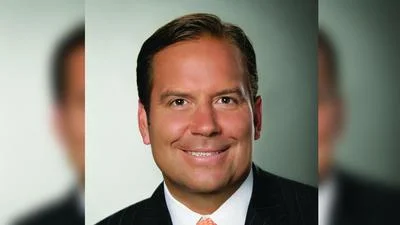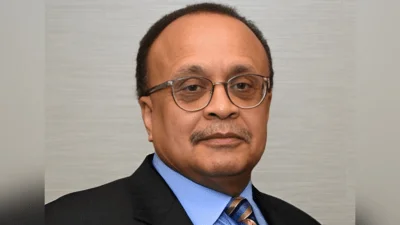Tony Sanders, State Superintendent of Education | School District U-46 / Facebook
Tony Sanders, State Superintendent of Education | School District U-46 / Facebook
Illinois State Board of Education, Balanced Accountability Measure Committee met Nov. 2.
Here are the minutes provided by the committee:
IBAM Members Present:
Jeff Broom, Chicago Public Schools
Dr. Daniel Krause, Illinois Principals Association
Cathy Mannen, Illinois Federation of Teachers (In Person – S)
Diana Zaleski, Illinois Education Association
Emily Warnecke, Illinois Association of School Administrators
Kimberly Small, Illinois Association of School Boards
Erin Roche, Chicago Principals Association
Dr. Mark Klaisner, Illinois Association of Regional School Superintendents
Karl Goeke, Illinois Education Association (in Person – S)
IBAM Members Absent:
Leonor Torres, Chicago Teachers Union
ISBE Staff Present:
Rae Clementz, Executive Director of Data, Assessment and Accountability
Dr. Christine Paxson, Director of School/District Improvement
Amy Hyde, Administrative Assistant to Data, Assessment and Accountability
Welcome and roll call by Ms. Clementz.
Ms. Mannen asked members of the committee to introduce themselves and the organization they represented.
Ms. Mannen made a motion to approve the September 7, 2023, meeting minutes. The motion was approved by Dr. Krause and seconded by Mr. Broom. The minutes were approved.
A voice vote was called for Dr. Klaisner regarding the only nomination for appointment of a vice chair. The vice chair appointment was approved.
Ms. Clementz provided a review of the 2023 summative designations.
The committee and Ms. Clementz had continued conversation about the 2023 summative designations.
Mr. Goeke asked if there was a way to present data on the following:
• What the exiting schools/districts have in common?
• What the exemplary schools/districts have in common in number form
• Of the ones that have exited, can we get a very high-level report of what sort of intervention they did to contribute to their exiting?
• What specific strategies are you using that have seeing efficacy and help them exit?
Ms. Clementz asked Dr. Paxson what, if any data, does she have on the kinds of interventions that were being used by Cohort 2018.
Dr. Paxson explained that what is collected is within the grant itself. She stated this is something that she needs to further investigate even as the committee starts to look at the reporting that is being collected right now. She would not have that to share.
Ms. Clementz stated that Ms. Paxson could pull the district-level budgets and look at what categories they’re reporting but said it could be broken down into very broad categories. There could be a differential analysis of those that stayed in Intensive support and those that exited status.
Mr. Goeke stated he would be interested to see if schools/districts that exited status spent all their money on hiring staff and reducing class size numbers. Maybe schools that are still in status spent it all on professional development. What solutions did the exiting schools came up with? Can such solutions be replicated? Mr. Goeke also asked about a conversation the committee had about partnering schools that had exited with the rules that were still in place and learning and developing a relationship between those districts so that they could learn from a group that exited. At a relational level, what can a school do to get out of status, if it's even statically possible?
Ms. Clementz segued the conversation to Dr. Paxson to discuss what the School/District Improvement Department is doing for those schools.
Mr. Broom asked if Ms. Clementz could give the committee any sense of the kinds of questions that are going to be asked in the future about how the system is -- or should be – functioning. There may be some analyses or cuts of the data that would help committee members inform their responses and advice to those conversations.
Ms. Clements stated that the committee must continue to probe the question of chronic absenteeism. She feels there are both technical and policy-related answers. There is a great deal of concern and number of questions over the impact and use of a mental health days. They exist and students are allowed to take them, but they are only unexcused absences. PRELIMINARY data show less than 15% of districts in the state are reporting mental health days in their attendance data to ISBE. She does not know if that means that they literally don't have students taking mental health days. Or if they have students taking mental health days but they don't track it locally. Or if they have students taking mental health days, they are tracking it locally, and they are not reporting that data to the state. Any of those three or all three could be true. Unfortunately, Ms. Clementz said she does not have a good answer and stated that we need another year's worth of data to know if that's something that's going to change.
Mr. Broom stated that if there is going to be a conversation about the mental health days, chronic absences, and the accountability system, then one question that comes to mind is: What is the correlation between those schools that are reporting mental health days and the impact of chronic absences and thus impact on status? The committee could do a little bit of unpacking on the data it has to determine the impact of the mental health policy. Some of the designations, for example.
Ms. Mannen stated she has struggled with the chronic absenteeism issue. The mental health days for students are intended to be support and start to break down the stigma related to the importance of a student caring for their mental health. Maybe students have stress in school. Students need pause, especially and since COVID-19. Parents are a lot more conscientious of when to send their students to school and when to keep them home because they're exhibiting certain symptoms. She said she really struggles with whether the accountability system is supporting those kinds of decisions, which are good for health and public health, and yet it's also potentially punishing a school where that's happening. Ms.
Mannen said she thinks that gets to the point of where it's both a technical and a policy discussion because that's a real struggle that she has. Parents that maybe choosing to keep the child home because of a flu outbreak in their school. The child may not be sick, but they're going to keep them home so that they avoid potentially getting the flu. Those weren't decisions that people were making five years ago.
Mr. Goeke stated he thinks it bears to have a policy discussion around what absenteeism is. A student can be physically not at school and keep up with exactly what they’re supposed to do. That was evident when there was hybrid teaching. There were students that were never seen in the classroom who still did just as well, still learned just as much as students in the classroom. They weren't counted absent because they were at home doing the work. So, the question then become from a policy level, what does absenteeism mean?
There's a difference between being home and keeping up with your work and being home and not doing anything. Mr. Goeke thinks the committee can say that physically absent no longer means mentally absent, and mental health days are where a student is physically absent, but oftentimes mentally, still engaged with the work. They might just need to be doing it from home. There are situations where hybrid learning is the new norm. There are classes in his district that are blended classes, they only meet physically on certain days and the students are still present but not in the class on other days. Students are doing their work either remotely or in the library, or it sometimes in the classroom, but they don't physically have to be in the classroom to be present. So, a discussion at the policy level about what is absenteeism is is warranted.
Ms. Clementz stated it is within a district's purview to create and have virtual or hybrid program. It's just finding that logistically those are more challenging. This is very much a policy and technical conversation.
Mr. Goeke stated that a student can take a mental health day, just do the work at home, and come back and be in the same place as everyone that was in the room. Is the student absent or just not in the room? That bears some serious discussion because when we're looking at chronic absenteeism as such a strong indicator of being in status, then it is worth talking about.
Ms. Clementz wants to talk about the questions she may bring to the IBAM Committee with respect to the accountability system. Is how we think about high school accountability different? She said she doesn’t think the high school accountability system works as well as it needs to. Illinois is not detecting student groups that are underperforming because it's just harder to have them. Fifty percent of the weight is on just a single indicator or grad rate, which is such a lagging indicator anyway. It is problematic. It's a very narrow performance band for the most part. There's not a lot of meaningful differentiation of school performance within the indicator that has that high of a weight. It begs a policy question, which is: What would a high school growth indicator look like? What are the pros and cons? What other indicators might the committee consider at the high school level? It can be discussed to the extent to which the college and career readiness indicator is or is not moving on its path toward validation, but as it was written, the validation is rocky at best. There are many compelling questions that the committee needs to ask about extent of the high school system. Is it working in the ways we intended?
Dr. Klaisner stated that he thinks maybe the next time the committee gets together he would love to talk about what priorities and hopeful outcomes. What do committee members want to contribute, and how do they help? He said he was talking about redefining and looking at new indicators for college, career, and life ready. He was not proposing those because that haven't yet been drafted. Mr. Klaisner
stated that all over the country, people are asking, what does it mean to be college, career, and life ready?
The time is right to ask those questions.
Dr. Paxson shared an update on a more rigorous needs assessment. The four parts that were given to the American Institutes for Research:
• General recommendations
• Equity-focused question
• Process questions and data analysis
• Recommendations focused on process/school improvement planning
Dr. Paxson provided an update. She said the agency really stayed true to the language and clearly this document is not focused on Chicago Public Schools. This is very much the rest of state because this is facilitating the Illinois Quality Framework Supporting Rubric. The committee wants to provide very clear guidance so that a school principal or district leader could work through this from top to bottom with their school leadership team to facilitate a conversation and get this rolling. She also stated there is continuous improvement as well. She advised committee members they inform her about anything they felt could be done better.
Dr. Kraus stated it's a nice guide to make sure the right people are at the table to have this dialog. She said she really liked that this is a guide that speaks to what has been talked about over the last year regarding those schools that really need to dig into specific areas as opposed to sort of generalize. He said his school wanted to do a School Improvement Plan and missed the mark. The school leaders know where their areas for opportunities for growth can be identified. The one he would just add as another data source would be the summary designation summary from IWAS. That gives the most crystal-clear picture of where a school scored for the Report Card designation.
Mr. Kraus added he and Ms. Warnecke were communicating with some principals across the state a little bit about a new digital version of the SAT and its potential impact in the spring. It's got a lot of folks nervous, not knowing what the results will look like just yet. So, whether that's just an opportunity for dialoged with this group or with the State Assessment Review Committee (SARC) or both. The initial fall assessments and the digital version are starting to roll in and folks just have questions. It might just be a potential big data review analysis: What did we find from the fall assessments? Ms. Clementz stated it was more appropriation for SARC than IBAM. But this is one of the reasons why she feels it’s so valuable. Having a couple, two, or three community members who cross the different groups so that concerns are heard in one place. So said she was going to pose that analysis to SARC. Once it's done, there's no reason it can't be shared with IBAM as well.
Ms. Mannen proposed the following dates for 2024 hybrid IBAM Committee meetings:
• February 1, 2024, 10 a.m.-Noon
• April 29, 2024, 1-3 p.m.
• June 11, 2024, 2-4 p.m.
Ms. Mannen called for public comment. No public comment.
Mr. Goeke made the motion to adjourn the meeting; it was seconded by Mr. Broom
Meeting adjourned at 4:02 p.m.
Next meeting is 2-4pm on December 7, 2023, via GoTo Meeting or the Vcon room at ISBE Springfield/Chicago offices.
https://www.isbe.net/Documents_BAMC/20231102-Minutes.pdf






 Alerts Sign-up
Alerts Sign-up